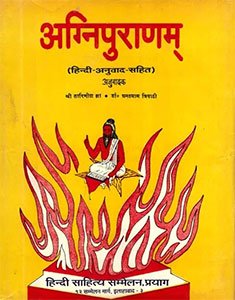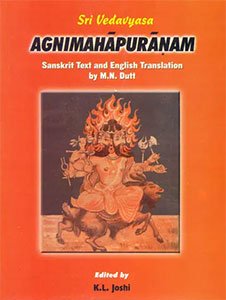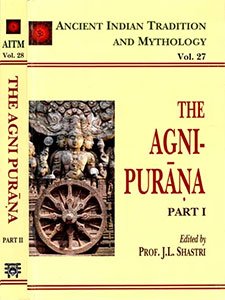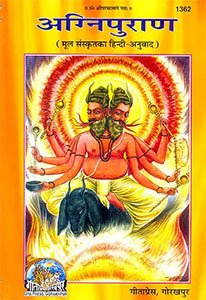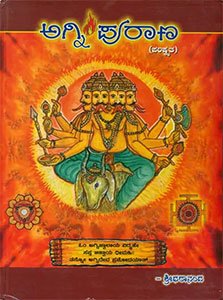Agni Purana [sanskrit]
97,288 words
This Sanskrit edition of the Agnipurana. It is one of the traditional eighteen Mahapuranas presented as an encyclopedia of ancient Indian history and knowledge. It contains either 382 or 383 chapters and over 10.000 verses (Sanskrit Shlokas).
Verse 27.52
ओं सुंगन्धतन्मात्रे वियुङ्क्ष्व हुं फट् । ओं सम्पाहिं हा ॥ ओं खं खं क्ष प्रकृत्या । ओं सुं हुं गन्धतन्मात्रे संहर स्वाहा ।
ततः पूर्णाहुतिश्चैवमुत्तरेषु प्रयुज्यते ।
ओं रां रसतन्मात्रे । ओं भें रूपतन्मात्रे । ओं रं स्पर्शतन्मात्रे । ओं एं शब्दतन्मात्रे । ओं भं नमः । ओं सों अहङ्कारः । ओं नं बुद्धे । ओं ओं प्रकृते ।
एकमूर्तावयं प्रोक्तो दीक्षायोगः समासतः ।
एवमेव प्रयोगस्तु नवव्यूहादिके स्मृतः ॥ ५२ ॥
oṃ suṃgandhatanmātre viyuṅkṣva huṃ phaṭ | oṃ sampāhiṃ hā || oṃ khaṃ khaṃ kṣa prakṛtyā | oṃ suṃ huṃ gandhatanmātre saṃhara svāhā |
tataḥ pūrṇāhutiścaivamuttareṣu prayujyate |
oṃ rāṃ rasatanmātre | oṃ bheṃ rūpatanmātre | oṃ raṃ sparśatanmātre | oṃ eṃ śabdatanmātre | oṃ bhaṃ namaḥ | oṃ soṃ ahaṅkāraḥ | oṃ naṃ buddhe | oṃ oṃ prakṛte |
ekamūrtāvayaṃ prokto dīkṣāyogaḥ samāsataḥ |
evameva prayogastu navavyūhādike smṛtaḥ || 52 ||
The Sanskrit text of Verse 27.52 is contained in the book The Agni Puranam (Anandashram Edition) by Shri Chimna Apate (श्री चिमणा आपटे). This book is available online or you could buy the latest edition:
Read online Buy now! The Sanskrit text by Shri Chimna Apate (श्री चिमणा आपटे) (1987)
Glossary of Sanskrit terms
Note: This extracts Sanskrit terms and links to English definitions from the glossary, based on an experimental segmentation of verse (27.52). Some terms could be superfluous while some might not be mentioned. Click on the word to show English definitions.
Hum, Phat, Sampa, Ahi, Kham, Kha, Ksha, Gandhatanmatra, Samhara, Svaha, Tatah, Tad, Tata, Purnahuti, Evam, Eva, Uttara, Pra, Rasatanmatra, Bha, Rupatanmatra, Sparshatanmatra, Shabdatanmatra, Nama, Namas, Ahankara, Buddha, Buddhi, Prakrita, Prakriti, Prakrit, Ekamurti, Aya, Idam, Prokta, Diksha, Ayoga, Samasatah, Prayoga, Navavyuha, Adika, Smrita,
Analysis of Sanskrit grammar
Note: this is an experimental feature and only shows the first possible analysis of the Sanskrit text (Verse 27.52). If the system was successful in segmenting the sentence, you will see of which words it is made up of, generally consisting of Nouns, Pronouns, Verbs, Participles and Indeclinables. Click on the link to show all possible derivations of the word.
- Line 1: “oṃ suṃgandhatanmātre viyuṅkṣva huṃ phaṭ | oṃ sampāhiṃ hā || oṃ khaṃ khaṃ kṣa prakṛtyā | oṃ suṃ huṃ gandhatanmātre saṃhara svāhā ”
- Cannot analyse om*su
- Cannot analyse suṅgandhatanmātre*vi
- vi -
-
vi (indeclinable adverb)[indeclinable adverb]vi (indeclinable preposition)[indeclinable preposition]vi (noun, masculine)[compound], [adverb]vi (noun, neuter)[compound], [adverb], [nominative single], [vocative single], [accusative single]ve (noun, masculine)[adverb]vī (noun, feminine)[adverb]vī (noun, masculine)[adverb]vī (noun, neuter)[compound], [adverb], [nominative single], [vocative single], [accusative single]vi (Preverb)[Preverb]
- yuṅkṣva -
-
√yuj (verb class 7)[imperative middle second single]
- hum -
-
hum (indeclinable)[indeclinable]
- phaṭ -
-
phaṭ (indeclinable)[indeclinable]
- Cannot analyse om*sa
- sampā -
-
sampa (noun, masculine)[compound], [vocative single]sampā (noun, feminine)[nominative single]
- ahim -
-
ahi (noun, masculine)[accusative single]
- hā* -
-
- Cannot analyse om*kh
- kham -
-
kham (indeclinable)[indeclinable]kha (noun, masculine)[adverb], [accusative single]kha (noun, neuter)[adverb], [nominative single], [accusative single]khā (noun, feminine)[adverb]
- kham -
-
kham (indeclinable)[indeclinable]kha (noun, masculine)[adverb], [accusative single]kha (noun, neuter)[adverb], [nominative single], [accusative single]khā (noun, feminine)[adverb]
- kṣa -
-
kṣa (noun, masculine)[compound], [vocative single]kṣa (noun, neuter)[compound], [vocative single]
- prakṛtyā* -
-
- Cannot analyse om*su
- Cannot analyse sum*hu
- hum -
-
hum (indeclinable)[indeclinable]
- gandhatanmātre -
-
gandhatanmātra (noun, masculine)[locative single]gandhatanmātra (noun, neuter)[nominative dual], [vocative dual], [accusative dual], [locative single]
- saṃhara -
-
saṃhara (noun, masculine)[compound], [vocative single]
- svāhā -
-
svāhā (indeclinable)[indeclinable]svāhā (noun, feminine)[nominative single]
- Line 2: “tataḥ pūrṇāhutiścaivamuttareṣu prayujyate ”
- tataḥ -
-
tataḥ (indeclinable adverb)[indeclinable adverb]tataḥ (indeclinable correlative)[indeclinable correlative]tataḥ (indeclinable)[indeclinable]tad (noun, neuter)[ablative single], [ablative dual], [ablative plural]tata (noun, masculine)[nominative single]√tan -> tata (participle, masculine)[nominative single from √tan class 8 verb]sa (noun, masculine)[ablative single], [ablative dual], [ablative plural]sā (noun, feminine)[ablative single], [ablative dual], [ablative plural]
- pūrṇāhutiś -
-
pūrṇāhuti (noun, feminine)[nominative single]
- cai -
-
ca (indeclinable conjunction)[indeclinable conjunction]ca (noun, masculine)[compound], [vocative single]ca (noun, neuter)[compound], [vocative single]cā (noun, feminine)[nominative single]
- evam -
-
evam (indeclinable adverb)[indeclinable adverb]evam (indeclinable)[indeclinable]eva (noun, masculine)[adverb], [accusative single]eva (noun, neuter)[adverb], [nominative single], [accusative single]evā (noun, feminine)[adverb]
- uttareṣu -
-
uttara (noun, masculine)[locative plural]uttara (noun, neuter)[locative plural]
- pra -
-
pra (noun, masculine)[compound], [vocative single]pra (noun, neuter)[compound], [vocative single]pra (Preverb)[Preverb]
- yujyate -
-
√yuj (verb class 7)[present passive third single]
- Line 3: “oṃ rāṃ rasatanmātre | oṃ bheṃ rūpatanmātre | oṃ raṃ sparśatanmātre | oṃ eṃ śabdatanmātre | oṃ bhaṃ namaḥ | oṃ soṃ ahaṅkāraḥ | oṃ naṃ buddhe | oṃ oṃ prakṛte ”
- Cannot analyse om*rā
- rām -
-
rā (noun, feminine)[accusative single]
- rasatanmātre -
-
rasatanmātra (noun, neuter)[nominative dual], [vocative dual], [accusative dual], [locative single]
- Cannot analyse om*bh
- bhe -
-
bha (noun, masculine)[compound], [vocative single], [locative single]bha (noun, neuter)[compound], [nominative dual], [vocative single], [vocative dual], [accusative dual], [locative single]bhā (noun, feminine)[nominative single], [nominative dual], [vocative single], [vocative dual], [accusative dual]bhā (noun, masculine)[instrumental single], [dative single]
- im -
-
i (noun, masculine)[accusative single]
- rūpatanmātre -
-
rūpatanmātra (noun, masculine)[locative single]rūpatanmātra (noun, neuter)[nominative dual], [vocative dual], [accusative dual], [locative single]
- Cannot analyse om*ra
- ram -
-
ra (noun, masculine)[adverb], [accusative single]ra (noun, neuter)[adverb], [nominative single], [accusative single]rā (noun, feminine)[adverb]
- sparśatanmātre -
-
sparśatanmātra (noun, neuter)[nominative dual], [vocative dual], [accusative dual], [locative single]
- Cannot analyse om*eṃ
- Cannot analyse em*śa
- śabdatanmātre -
-
śabdatanmātra (noun, neuter)[nominative dual], [vocative dual], [accusative dual], [locative single]
- Cannot analyse om*bh
- bham -
-
bha (noun, masculine)[adverb], [accusative single]bha (noun, neuter)[adverb], [nominative single], [accusative single]bhā (noun, feminine)[adverb]bhā (noun, masculine)[adverb]
- namaḥ -
-
namas (noun, masculine)[compound], [vocative single]namas (noun, neuter)[compound], [nominative single], [vocative single], [accusative single]nama (noun, masculine)[nominative single]
- Cannot analyse om*so
- so -
-
sā (indeclinable correlative)[indeclinable correlative]so (noun, feminine)[compound]sa (noun, neuter)[compound], [vocative single]sa (noun, masculine)[nominative single]sā (noun, feminine)[nominative single]
- um -
-
u (noun, masculine)[accusative single]
- ahaṅkāraḥ -
-
ahaṅkāra (noun, masculine)[nominative single]
- Cannot analyse om*na
- Cannot analyse nam*bu
- buddhe -
-
buddha (noun, masculine)[locative single]buddha (noun, neuter)[nominative dual], [vocative dual], [accusative dual], [locative single]buddhā (noun, feminine)[nominative dual], [vocative single], [vocative dual], [accusative dual]buddhi (noun, feminine)[vocative single]
- Cannot analyse om*oṃ
- Cannot analyse om*pr
- prakṛte -
-
prakṛta (noun, masculine)[locative single]prakṛta (noun, neuter)[nominative dual], [vocative dual], [accusative dual], [locative single]prakṛtā (noun, feminine)[nominative dual], [vocative single], [vocative dual], [accusative dual]prakṛti (noun, feminine)[vocative single]prakṛt (noun, masculine)[dative single]prakṛt (noun, feminine)[dative single]prakṛt (noun, neuter)[dative single]
- Line 4: “ekamūrtāvayaṃ prokto dīkṣāyogaḥ samāsataḥ ”
- ekamūrtāva -
-
ekamūrti (noun, feminine)[locative single]
- ayam -
-
aya (noun, masculine)[adverb], [accusative single]idam (pronoun, masculine)[nominative single]
- prokto* -
-
prokta (noun, masculine)[nominative single]
- dīkṣā -
-
dīkṣā (noun, feminine)[nominative single]
- ayogaḥ -
-
ayoga (noun, masculine)[nominative single]
- samāsataḥ -
-
samāsataḥ (indeclinable)[indeclinable]
- Line 5: “evameva prayogastu navavyūhādike smṛtaḥ ”
- evam -
-
evam (indeclinable adverb)[indeclinable adverb]evam (indeclinable)[indeclinable]eva (noun, masculine)[adverb], [accusative single]eva (noun, neuter)[adverb], [nominative single], [accusative single]evā (noun, feminine)[adverb]
- eva -
-
eva (indeclinable particle)[indeclinable particle]eva (noun, masculine)[compound], [vocative single]eva (noun, neuter)[compound], [vocative single]
- prayogas -
-
prayoga (noun, masculine)[nominative single]
- tu -
-
tu (indeclinable particle)[indeclinable particle]
- navavyūhā -
-
navavyūha (noun, masculine)[compound], [vocative single]
- adike -
-
adika (noun, masculine)[locative single]adika (noun, neuter)[nominative dual], [vocative dual], [accusative dual], [locative single]
- smṛtaḥ -
-
smṛta (noun, masculine)[nominative single]√smṛ -> smṛta (participle, masculine)[nominative single from √smṛ class 1 verb]
Other editions:
Also see the following editions of the Sanskrit text or (alternative) English translations of the Verse 27.52
Agni Purana with Hindi Translation
by Tarinish Jha and Dr. Ghanshayam Tripathi (तारिणीश् झा और डॉ. घनश्याम त्रिपाठी) (2007)
Publisher: Hindi Sahitya Sammelan, Allahabad; 1199 pages; Title: अग्निपुराणम् (संस्कृत एवं हिन्दी अनुवाद);
Buy now!
Agni Purana (Two Volumes)
by M. N. Dutt (2023)
Publisher: Parimal Publication Pvt. Ltd.; Editor: K. L. Joshi.; ISBN-10: 8171101690; ISBN-13: 9788171101696; 1070 pages.
Buy now!
Agni-Purana (Set of 4 Volumes)
by N. Gangadharan (2006)
Publisher: Motilal Banarsidass Publishers Pvt. Ltd.; ISBN: Part I 8120803590 (9788120803596); Part II 8120803604 (9788120803602); Part III 8120801741 (9788120801745); Part IV 812080306X (9788120803060); 1271 pages.
Buy now!
The Agni Purana (Hindi)
by (2013)
Publisher: Gita Press, Gorakhpur; Title: अग्निपुराण (केवल हिन्दी अनुवाद); ISBN-10: 8129302934; ISBN-13: 9788129302939; 848 pages.
Buy now!
Agni Purana (Kannada)
by Sreedharananda (2013)
Publisher: Pooja Pusthaka Bhandara, Bangalore; Title: ಅಗ್ನಿ ಪುರಾಣ; 560 pages.
Buy now!Preview of verse 27.52 in Kannada sript:
ಓಂ ಸುಂಗನ್ಧತನ್ಮಾತ್ರೇ ವಿಯುಙ್ಕ್ಷ್ವ ಹುಂ ಫಟ್ । ಓಂ ಸಮ್ಪಾಹಿಂ ಹಾ ॥ ಓಂ ಖಂ ಖಂ ಕ್ಷ ಪ್ರಕೃತ್ಯಾ । ಓಂ ಸುಂ ಹುಂ ಗನ್ಧತನ್ಮಾತ್ರೇ ಸಂಹರ ಸ್ವಾಹಾ ।
ತತಃ ಪೂರ್ಣಾಹುತಿಶ್ಚೈವಮುತ್ತರೇಷು ಪ್ರಯುಜ್ಯತೇ ।
ಓಂ ರಾಂ ರಸತನ್ಮಾತ್ರೇ । ಓಂ ಭೇಂ ರೂಪತನ್ಮಾತ್ರೇ । ಓಂ ರಂ ಸ್ಪರ್ಶತನ್ಮಾತ್ರೇ । ಓಂ ಏಂ ಶಬ್ದತನ್ಮಾತ್ರೇ । ಓಂ ಭಂ ನಮಃ । ಓಂ ಸೋಂ ಅಹಙ್ಕಾರಃ । ಓಂ ನಂ ಬುದ್ಧೇ । ಓಂ ಓಂ ಪ್ರಕೃತೇ ।
ಏಕಮೂರ್ತಾವಯಂ ಪ್ರೋಕ್ತೋ ದೀಕ್ಷಾಯೋಗಃ ಸಮಾಸತಃ ।
ಏವಮೇವ ಪ್ರಯೋಗಸ್ತು ನವವ್ಯೂಹಾದಿಕೇ ಸ್ಮೃತಃ ॥ ೫೨ ॥
![Agni Purana [sanskrit] - book cover](/uploads/a/Agni-Purana-Sanskrit.jpg)
